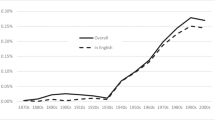Conclusions
The Austrian tradition is identified by an built upon praxeology—the application of deductive reasoning to the irrefutable fact of human action. This method is the red thread that runs from Menger to Böhm-Bawerk to Mises to Murray Rothbard and the modern practitioners of Austrian economics. Working within this tradition, economists have produced a great edifice of irrefutable, universally applicable economic theory. They have shown how the free market advances mankind in its struggle against scarcity and why socialism cannot do so. They have taught us that we must choose one of these two social arrangements, since no system exists between them. We must make our selection and advance, by education and persuasion, either capitalism or socialism. Let us choose wisely.
Similar content being viewed by others
References
Böhm-Bawerk, Eugen.Capital and Interest. Spring Mills, Penn.: Libertarian Press, 1959.
Ebeling, Richard. “Economic Calculation Under Socialism: Ludwig von Mises and His Predecessors,” inThe Meaning of Ludwig von Mises, Jeffrey Herbener, ed. Boston: Kluwer Academic Publishers, 1991.
Friedman, Milton. “The Methodology of Positive Economics,” inEssays in Positive Economics. Chicago: University of Chicago Press, 1974.
Hayek, F. A. “Introduction,” inPrinciples of Economics, by Carl Menger. New York: New York University Press, 1976.
—The Fatal Conceit: The Errors of Socialism. Chicago: University of Chicago Press, 1988.
Hoppe, Hans-Hermann.Praxeology and Economic Science. Auburn, Ala.: The Ludwig von Mises Institute, 1988.
Menger, Carl.Principles of Economics. New York: New York University Press, 1976.
—.Investigations into the Method of the Social Sciences with Special Reference to Economics. New York: New York University Press, 1985.
Mises, Ludwig von.Human Action: A Treatise on Economics, 3rd rev. ed. Chicago: Henry Regnery, 1966.
Quoted by Margit von Mises in, “A Call to Activism,” inThe Free Market Reader. Auburn, Ala.: The Ludwig von Mises Institute, 1988.
Rothbard, Murray.The Essential Ludwig von Mises. Auburn, Ala.: The Ludwig von Mises Institute, 1983.
— “Mises and the Role of Economist in Public Policy,” inThe Meaning of Ludwig von Mises, Jeffrey Herbener, ed. Boston: Kluwer Academic Publishers, 1991.
Salerno, Joseph. “Ludwig von Mises as Social Rationalist,” inThe Meaning of Ludwig von Mises, Jeffrey Herbener, ed. Boston: Kluwer Academic Publishers, 1991.
Author information
Authors and Affiliations
Rights and permissions
About this article
Cite this article
Herbener, J.M. Ludwig von Mises and the Austrian School of Economics. Rev Austrian Econ 5, 33–50 (1991). https://doi.org/10.1007/BF02426927
Issue Date:
DOI: https://doi.org/10.1007/BF02426927




